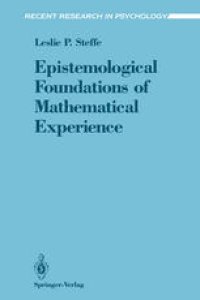
Ebook: Epistemological Foundations of Mathematical Experience
- Tags: Psychology general, Mathematics general
- Series: Recent Research in Psychology
- Year: 1991
- Publisher: Springer-Verlag New York
- Edition: 1
- Language: English
- pdf
On the 26th, 27th, and 28th of February of 1988, a conference was held on the epistemological foundations of mathematical experience as part of the activities of NSF Grant No. MDR-8550463, Child Generated Multiplying and Dividing Algorithms: A Teaching Experiment. I had just completed work on the book Construction of Arithmetical Meanings and Strategies with Paul Cobb and Ernst von Glasersfeld and felt that substantial progress had been made in understanding the early numerical experiences of the six children who were the subjects of study in that book. While the book was in preparation, I was also engaged in the teaching experiment on mUltiplying and dividing algorithms. My focus in this teaching experiment was on investigating the mathematical experiences of the involved children and on developing a language through which those experiences might be expressed. However, prior to immersing myself in the conceptual analysis of the mathematical experiences of the children, I felt that it was crucial to critically evaluate the progress that we felt we had made in our earlier work. It was toward achieving this goal that I organized the conference. When trying to understand the mathematical experiences of a child, one can do no better than to interact with the child in a mathematical context guided by the intention to specify the child's current knowledge and the progress the child might make.
Content:
Front Matter....Pages i-xvii
Philosophical and Psychological Aspects of Constructivism....Pages 1-13
The Import of Fodor’s Anti-Constructivist Argument....Pages 14-25
The Learning Paradox: A Plausible Counterexample....Pages 26-44
Abstraction, Re-Presentation, and Reflection: An Interpretation of Experience and Piaget’s Approach....Pages 45-67
A Pre-Logical Model of Rationality....Pages 68-77
Recursion and the Mathematical Experience....Pages 78-101
The Role Mathematical Transformations and Practice in Mathematical Development....Pages 102-123
The Concept of Exponential Functions: A Student’s Perspective....Pages 124-159
Constructive Aspects of Reflective Abstraction in Advanced Mathematics....Pages 160-202
Reflective Abstraction in Humanities Education: Thematic Images and Personal Schemas....Pages 203-237
Enhancing School Mathematical Experience Through Constructive Computing Activity....Pages 238-259
To Experience is to Conceptualize: A Discussion of Epistemology and Mathematical Experience....Pages 260-281
Back Matter....Pages 283-312
Content:
Front Matter....Pages i-xvii
Philosophical and Psychological Aspects of Constructivism....Pages 1-13
The Import of Fodor’s Anti-Constructivist Argument....Pages 14-25
The Learning Paradox: A Plausible Counterexample....Pages 26-44
Abstraction, Re-Presentation, and Reflection: An Interpretation of Experience and Piaget’s Approach....Pages 45-67
A Pre-Logical Model of Rationality....Pages 68-77
Recursion and the Mathematical Experience....Pages 78-101
The Role Mathematical Transformations and Practice in Mathematical Development....Pages 102-123
The Concept of Exponential Functions: A Student’s Perspective....Pages 124-159
Constructive Aspects of Reflective Abstraction in Advanced Mathematics....Pages 160-202
Reflective Abstraction in Humanities Education: Thematic Images and Personal Schemas....Pages 203-237
Enhancing School Mathematical Experience Through Constructive Computing Activity....Pages 238-259
To Experience is to Conceptualize: A Discussion of Epistemology and Mathematical Experience....Pages 260-281
Back Matter....Pages 283-312
....